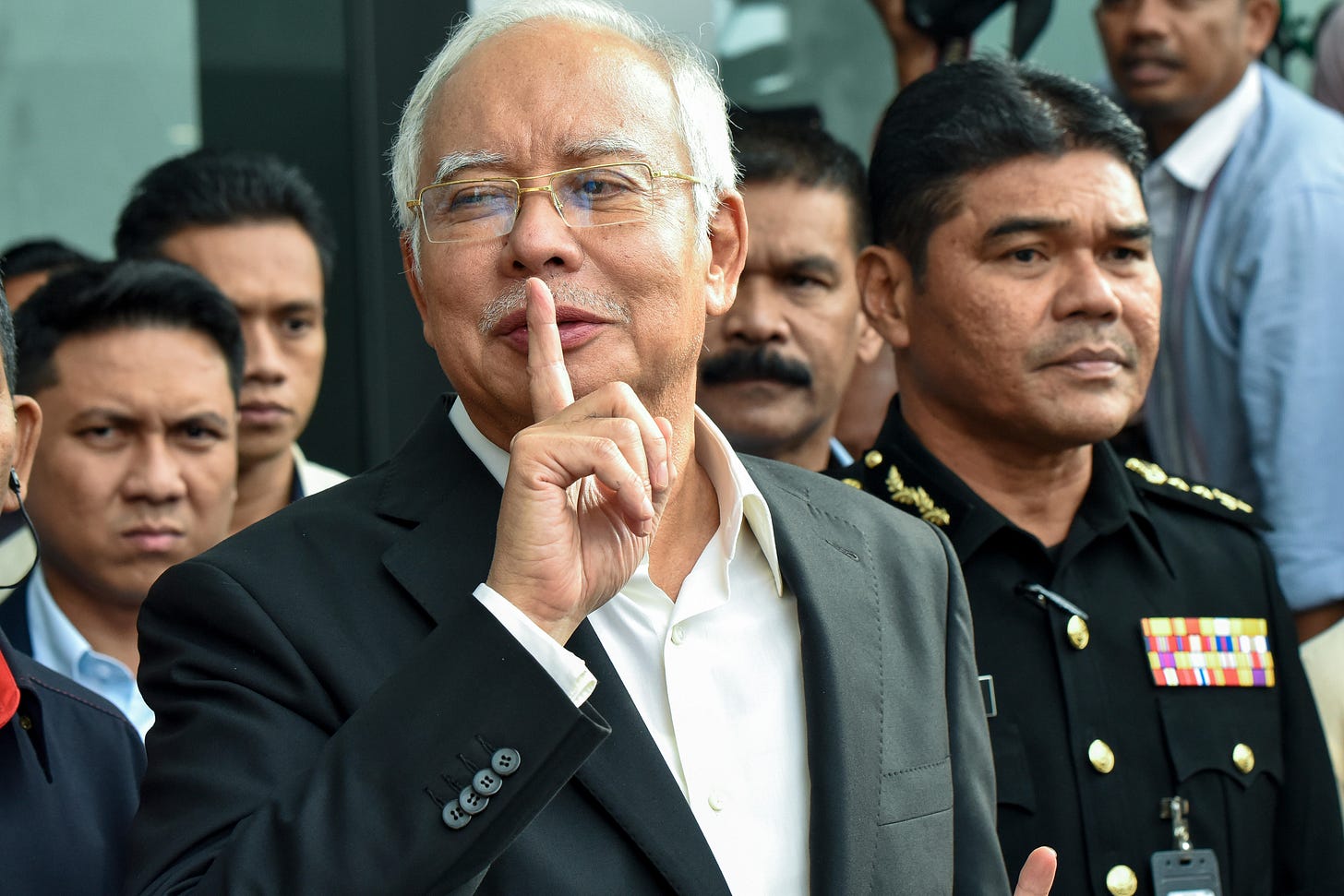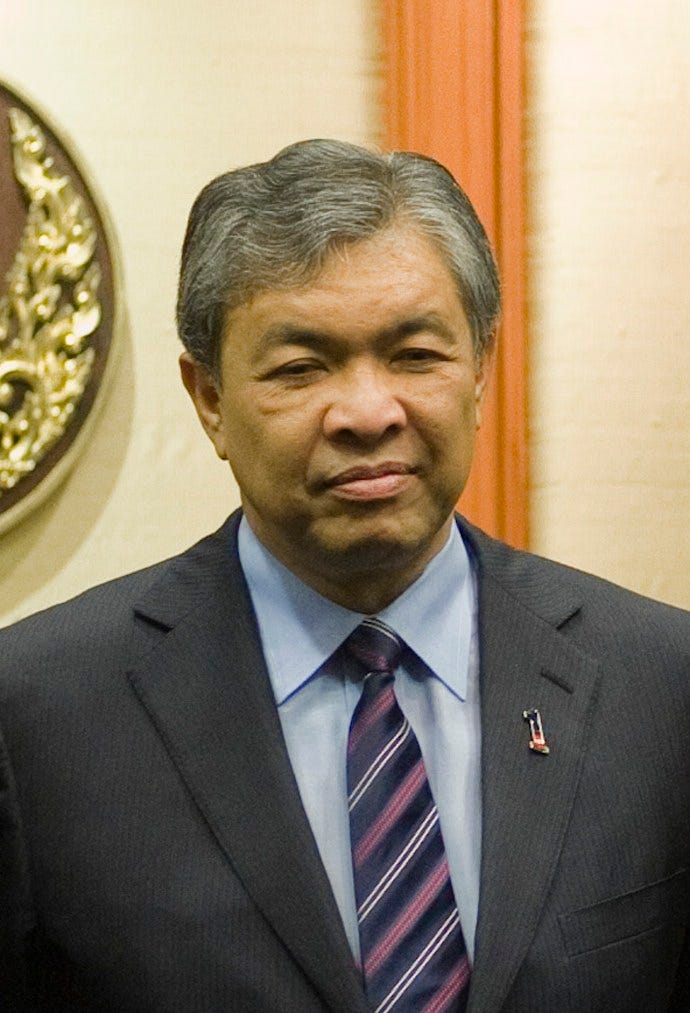(Former Malaysian Prime Minister Najib Razak, Source: Alamy)
Malaysia should be a far more successful country based on its natural resources, its geographical position spanning across the South China Sea from the Malay Peninsular to Borneo, and a dynamic population of just over 33 million ethnic Malay, Chinese and Indian citizens. Yet crime, corruption and cronyism have hindered development in the past few decades and events of the past few years raise the question of whether this situation will improve.
Recent corruption and criminal cases are an indicator of the state of the rule of law in Malaysia. Despite complex political drivers for many of the cases, the corruption itself is real at senior levels of government.
Corruption and Cronyism
On 23 January, the wife of former Finance Minister Daim Zainuddin was charged with failure to declare assets that include Ilham Tower (a 58 storey office building in Kuala Lumpur), the companies that control the building, two Mercedes-Benz cars and several properties in Kuala Lumpur and Penang. The accused, Ms. Na'imah Abdul Khalid, stated that the charges were a plot to tarnish her husband’s reputation, who had refused a directive from the Malaysian Anti-Corruption Commission (MACC) to declare his assets.
The investigation into Daim Zainuddin and his wife is one of multiple cases initiated by the MACC after information was disclosed in the Panama Papers and Pandora Papers, illustrating the necessity for investigative journalism as a key means of exposing suspected corruption. The response from Zainuddin and his wife is that the allegations are politically driven by Prime Minister Anwar Ibrahim in his long struggle against 98 year old former leader Mahathir Mohamed.
On 18 January, the MACC announced that Mirzan Mahathir, the eldest son of Mahathir Mohamed, had been served with a notice to declare all of his assets in Malaysia and overseas within 30 days, part of an investigation which the agency said was related to the Panama Papers as well as his business activities in relation to the sale and acquisition of a government-linked company. The suspicions against Mirzan Mahathir relate to the sale in 1998, when his father was Prime Minister, of his shipping businesses and two liquefied natural gas companies under the Konsortium Perkapalan listed group to state-owned energy company Petronas.
The denials of corruption and cronyism by political leaders will be disingenuous if corruption is proven, although it seems that some in the Malaysian government have considered themselves above the law for years. The most spectacular example of this belief was the conviction in July 2020 of former Prime Minister Najib Razak on charges of breach of trust, abuse of power, and money laundering for illegally receiving about $10 million from SRC International, a former unit of state fund 1MDB, for which he was sentenced to 12-years imprisonment and a fine of $50 million.
1MDB was a sovereign fund established in 2009 by Malaysian financier Jho Low to promote economic development, raising billions of dollars in bonds for use in investment projects and joint ventures. In 2015 leaked documents disclosed by investigative journalists revealed that Najib Razak had channelled around $700 million from 1MDB into accounts linked to him. The US Department of Justice, which investigated the multinational fraud, stated that $4.5 billion was diverted to offshore bank accounts and shell companies, and Najib Razac was referred to in the their case as "Malaysian Official 1".
Crime and Cronyism
On 22 January, a businessman and 10 others were charged in the Kota Kinabalu court with being members of the organised crime group “Geng Upik” (or ‘Upik Gang’) between 2015 and 2023. The businessman, Datuk Maslan Sani (‘Datuk’ is an honourary title conferred by the leader of a Malaysian state), is suspected to have operated the largest drug distribution syndicate in Sabah, the Malaysian province on the island of Borneo furthest away from the national capital Kuala Lumpur. The Malaysian police stated that the syndicate trafficked methamphetamines and laundered money through diverse businesses, including 12 tourism companies, manufacturing, oil and gas companies and a network of restaurants. Two of those charged so far are Malaysian police officers, one an Inspector from the Criminal Investigation Department and the other a sergeant in general operations.
Another eight people suspected to be members of “Geng Upik” are wanted by the police in connection with the case. The first arrests, including of Datuk Maslan Sani, were made in December 2023 by the Malaysian police who announced at the time that the “Geng Upik” used used commercial airlines and sea cargo to bring drugs to Sabah, where they were stored before being distributed to dealers in Malaysia or smuggled to Indonesia and the Philippines.
There is nothing new about drug trafficking across the in parts lawless Malay archipelago, which is comprised of 25,000 islands including Brunei, East Timor, Indonesia, Malaysia, Papua New Guinea, the Philippines and Singapore. This is a huge expanse of land and sea with little or no law enforcement in remote areas and frequent indifference to concept of national boundaries. Smuggling illicit goods has been a way of life for coastal dwellers in the region for centuries. The difficulty with combatting this deep rooted criminal trade is not the lack of law enforcement will, as evidenced by the efforts of the Royal Malaysian Police, but continued corruption in local and national government.
Datuk Maslan Sani was able to operate his drug trafficking from Sabah without interference from the authorities reportedly because of his close links to Malaysian politicians. There are allegations in Malaysian news media that Datuk Maslan Sani was assisted in the laundering of crime proceeds by Datuk Seri Shafie Apdal, the Minister for Rural & Regional Development. In addition, Sani is alleged to have donated criminal proceeds to the Parti Warisan (Heritage Party) when Shafie Apdal became the Chief Minister of Sabah from 2018 and Datuk Azis Jamman became the Deputy Minister of Home Affairs. The allegations indicate the seniority of those allegedly involved in corruption at the regional and national levels.
(Source: Sabhakini2)
Links between criminals and senior members of the government in Malaysia are nothing new. In 2014, Malaysian national Paul Phua was arrested by the FBI in Las Vegas for allegedly operating massive illegal betting on the FIFA World Cup and other sports competitions. The FBI believed that Phua was the owner of IBCbet, a huge Asian based sports betting operator. During Phua’s detention and trial in the US, the Malaysian Home Minister, Datuk Seri Ahmad Zahid Hamidi, wrote a letter to the FBI stating that Phua has supported the Malaysian government in issues related to national security and also that he was not a member of the 14K triad society. This was a blatant attempt to subvert a live US law enforcement investigation by the intervention of a senior Malaysian government minister. In 2015, he stated in the Malaysian parliament that “In this matter, as a Muslim, in the name of Allah, I have never received a single sen from that gambler, and I have never been involved with that person (Phua)”. In 2019, Datuk Seri Ahmad Zahid Hamidi was charged with 40 counts of bribery, and acquitted of the charges in 2022.
Datuk Seri Ahmad Zahid Hamidi is currently the Deputy Prime Minister of Malaysia.
(Source: thaigov, CC BY 2.0 <https://creativecommons.org/licenses/by/2.0>, via Wikimedia Commons )
Malaysia in Asia
The tourist slogan ‘Malaysia Truly Asia’ has become iconic and served the country well, but does not necessarily reflect well on other parts of Asia that are also developing economically but have a stronger focus on preventing crime, corruption and cronyism. Nearby Singapore shines as an example of a country where capital continues to flow inward, partly because of the widespread belief that the government has a strong commitment to combatting corruption and financial crime (illustrated by the Singapore Police action against a huge money laundering syndicate reported in the Asian Crime Century briefing 33).
Whilst Singapore has become associated with good governance, Malaysia has become perceived as a country where crime, corruption and cronyism are endemic. The conviction of a Prime Minister for stealing tens of millions of dollars from his own government is shocking in any country. Sadly in Malaysia, this case is one of many that continue to occur as senior leaders, usually Malay, seem to believe that they have the right to thrive because of their status and connections.
The World Bank projected that economic growth in Malaysia could increase by 4.3% in 2024, a strong number in any country in these troubled times. International confidence in the country and inward investment to support continued economic growth will require government persistence in fighting corruption and the ‘reformasi’ agenda to build a fairer country with better opportunities for all citizens. This should be the aim for a Malaysia that is truly Asia.





